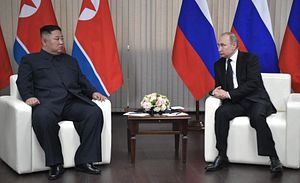North Korea said it hasn’t exported any weapons to Russia during the war in Ukraine and has no plans to do so, and said U.S. intelligence reports of weapons transfers were an attempt to tarnish North Korea’s image.
In a state media report Thursday, an unnamed North Korean defense official told the U.S. to stop making “reckless remarks” and to “keep its mouth shut.” Biden administration officials earlier this month confirmed a declassified U.S. intelligence assessment that Russia was in the process of purchasing arms from North Korea, including millions of artillery shells and rockets, as Moscow attempts to ease severe supply shortages in Ukraine worsened by U.S.-led export controls and sanctions.
The North Korean statement came weeks after Moscow described the U.S. intelligence finding as “fake.”
North Korean arms exports to Russia would violate United Nations resolutions banning the country from importing or exporting weapons.
The North Korean official stressed that Pyongyang has never recognized the “unlawful” U.N. Security Council sanctions against the country “cooked up by the U.S. and its vassal forces.” The official said the export and import of military equipment is a “lawful right peculiar to a sovereign state,” according to an English translation of the statement published by the North’s official Korean Central News Agency.
“But we take this opportunity to make clear one thing. We have never exported weapons or ammunition to Russia before and we will not plan to export them,” said the official, who was described as a vice director general of the National Defense Ministry’s general equipment bureau.
“It is not sure from where the rumor originated which the U.S. is spreading, but it is aimed at tarnishing the DPRK’s image,” the official said, referring to the country’s formal name, the Democratic People’s Republic of Korea.
Facing sanctions and export controls, Russia in August bought Iranian-made drones that U.S. officials said had technical problems. Experts say North Korea, if willing, could become a major source of small arms, artillery, and other ammunition for Russia, considering the compatibility of their defense systems based on Soviet roots.
North Korea has sought to tighten relations with Russia even as most of Europe and the West has pulled away, blaming the U.S. for the crisis and decrying the West’s “hegemonic policy” as justifying military action by Russia in Ukraine to protect itself. Pyongyang has voted with Russia at the United Nations on related measures, including the most recent vote allowing Ukraine’s President Volodymyr Zelenskyy to give a virtual address to the U.N. General Assembly. North Korea was one of just six countries to join Russia in voting against the measure.
The North Korean government has even hinted it is interested in sending construction workers to help rebuild pro-Russia breakaway regions in Ukraine’s east. In July, North Korea became the only nation aside from Russia and Syria to recognize the independence of the territories, Donetsk and Luhansk.
North Korea also has used the war as a window to accelerate its own arms development, testing dozens of weapons including its first long-range missiles since 2017, exploiting a divide in the U.N. Security Council, where Russia and China have blocked U.S. attempts to tighten sanctions on Pyongyang.
The North has punctuated its testing activity with repeated threats of nuclear conflict with Seoul and Washington. The latest was a law passed by Pyongyang’s rubber-stamp parliament this month that further enshrined the country’s status as a nuclear power and authorized the preemptive use of nuclear weapons over a broad range of scenarios where its leadership comes under threat.
Sung Kim, the Biden administration’s special representative for North Korea, met with South Korean counterpart Kim Gunn in Seoul on Thursday where they expressed “serious concern” over the North’s escalating nuclear doctrine spelled out in the new law, South Korea’s Foreign Ministry said.
The diplomats reaffirmed the U.S. commitment to defend South Korea in the event of a nuclear war with the full range of its military capabilities, including nuclear. The allies also maintained their months-old assessment that North Korea is gearing up to conduct its first nuclear test since 2017 and discussed “stern” countermeasures to such an action, the ministry said.

































